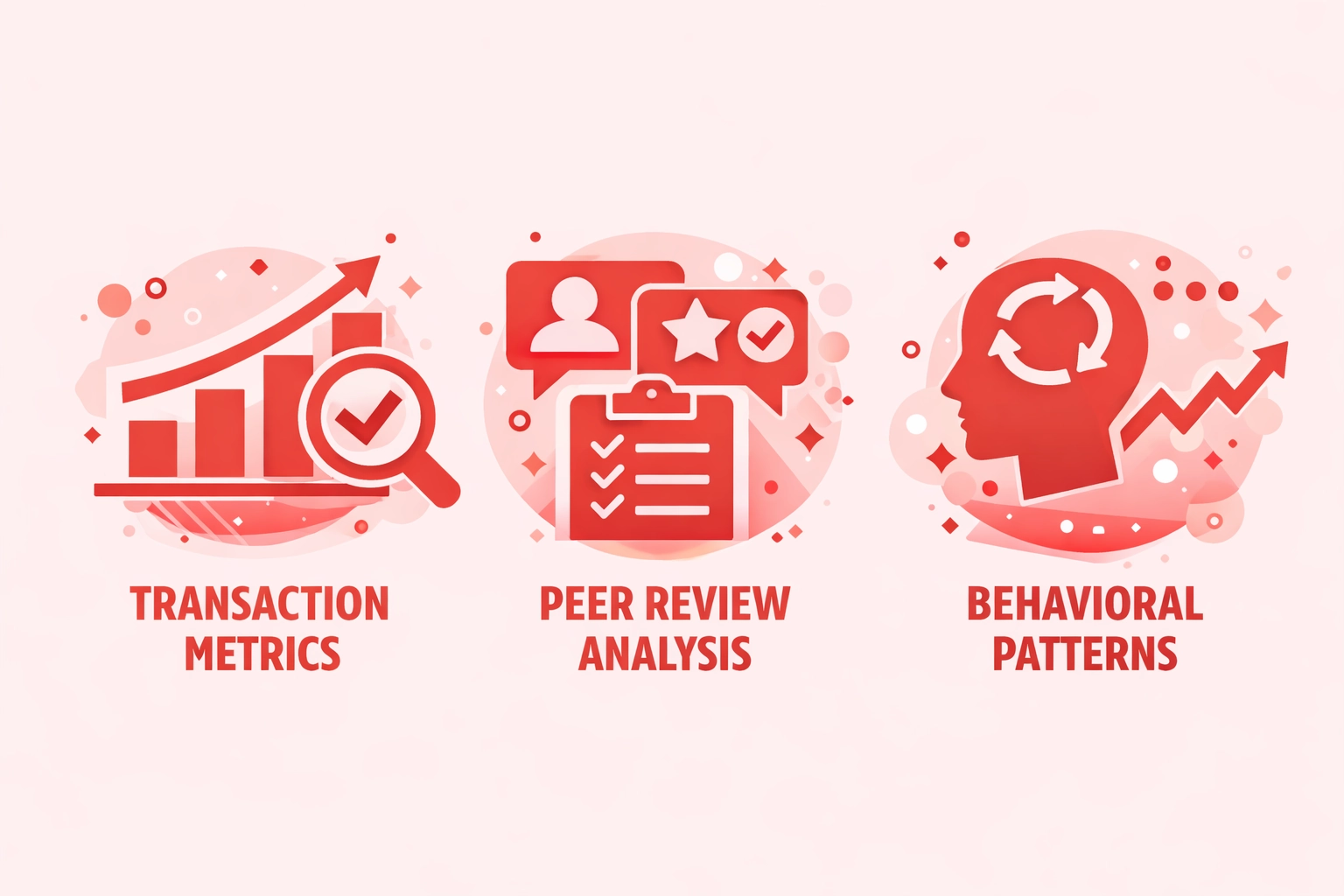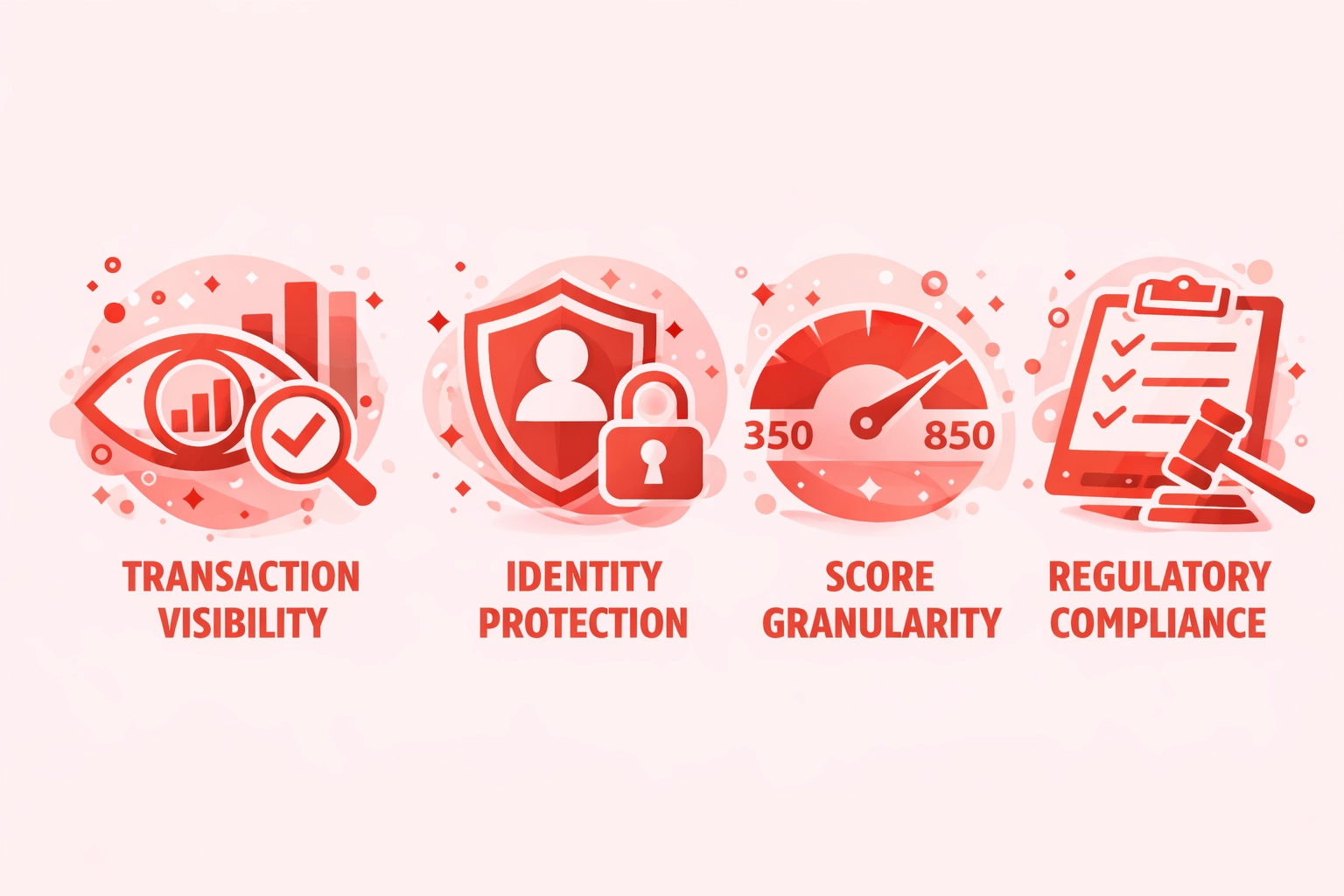Key Takeaways
- ▸Smart contract reputation systems automate trust scoring through immutable blockchain records, reducing fraud by 60-80% compared to centralized platforms while eliminating manipulation and fake reviews across USA, UK, UAE, and Canadian marketplaces.
- ▸Automated enforcement mechanisms in smart contract reputation systems restrict low-reputation users from high-value transactions, reducing verification costs by 70-85% while maintaining 99% accuracy through algorithmic scoring without human intermediaries.
- ▸Dispute resolution through smart contract reputation systems resolves conflicts in hours versus weeks required by traditional arbitration, using staked voting mechanisms and automated evidence evaluation ensuring fair, transparent outcomes globally.
- ▸Cross-platform reputation portability enabled by smart contract reputation systems allows users to transfer verified scores between ecosystems, reducing onboarding friction by 50-70% and preventing vendor lock-in across decentralized applications.
- ▸Token-based incentive structures in smart contract reputation systems reward positive behavior with lower fees, preferential access, and governance rights, increasing user engagement by 40-60% while discouraging malicious activity through automated penalties.
- ▸Implementation costs for smart contract reputation systems range from $100,000-$500,000 including algorithm development, security audits, sybil attack prevention, and testing, with operational savings of 60-75% compared to centralized trust infrastructures.
- ▸Privacy-preserving techniques in smart contract reputation systems use zero-knowledge proofs enabling reputation verification without exposing transaction details, complying with GDPR, CCPA, and data protection regulations across international markets simultaneously.
Introduction to Smart Contract Reputation Systems on Blockchain
Smart contract reputation systems represent revolutionary trust infrastructure replacing centralized rating platforms with transparent, tamper-proof, automated scoring mechanisms on blockchain networks. With over eight years of experience implementing blockchain solutions across USA, UK, UAE, and Canada, our agency has witnessed smart contract reputation systems transform how trust operates in decentralized marketplaces, peer-to-peer lending, freelance platforms, and governance systems. Traditional centralized reputation platforms suffer from fake reviews affecting 20-40% of ratings, selective data deletion favoring platforms over users, and opaque algorithms enabling bias and manipulation.
The convergence of blockchain immutability, smart contract automation, and cryptographic verification enables smart contract reputation systems delivering objective, verifiable, and portable trust scores accessible globally. These programmable systems record every transaction, interaction, and review on permanent ledgers, calculate reputation through transparent algorithms, and automatically enforce consequences based on scores without human intervention. Leading implementations report 60-80% fraud reduction, 70-85% lower verification costs, and 99% scoring accuracy compared to legacy centralized platforms serving millions of users worldwide.
Why Traditional Reputation Systems Fail Decentralized Ecosystems
Traditional reputation platforms encounter fundamental limitations preventing effective trust establishment in decentralized ecosystems. Centralized control enables platforms to manipulate ratings, delete unfavorable reviews, and prioritize paying advertisers over honest evaluation. Amazon removed millions of suspicious reviews in 2020, TripAdvisor faces ongoing litigation over fake content, and Yelp controversies involve alleged rating manipulation. These platforms retain complete data ownership preventing users from transferring hard-earned reputation to competing services, creating vendor lock-in and limiting opportunity across USA, UK, UAE, and Canadian markets.
Opacity in scoring algorithms compounds trust issues as platforms provide no visibility into calculation methods, weighting factors, or adjustment rationale. Users cannot verify accuracy, identify bias, or challenge unfair scores lacking transparent evidence. Bot-generated fake reviews, purchased positive ratings, and competitor sabotage through negative campaigns undermine system integrity. Smart contract reputation systems address these fundamental failures through immutable records, transparent algorithms, and decentralized governance eliminating platform control while ensuring verifiable, portable, and manipulation-resistant trust scoring.[1]
Core Components of Smart Contract Reputation Architecture
Smart contract reputation systems comprise interconnected components working together to establish trustless, transparent, and automated reputation tracking. On-chain scoring algorithms calculate reputation from transaction outcomes, review submissions, dispute resolutions, and behavioral patterns using predefined mathematical models. Immutable event logs store every interaction permanently preventing selective deletion or historical revision. Automated enforcement mechanisms restrict platform access and transaction capabilities based on reputation thresholds, while token-based incentives reward positive behavior and penalize malicious activity across global implementations.
| System Component | Function | Key Features | Impact |
|---|---|---|---|
| Scoring Algorithm | Calculates reputation from on-chain data | Transparent, weighted, time-decayed | 99% accuracy |
| Event Storage | Immutable transaction and review logs | Permanent, tamper-proof, auditable | Zero manipulation |
| Enforcement Logic | Restricts access based on reputation | Automated, threshold-based, graduated | 60-80% fraud reduction |
| Incentive Mechanism | Rewards positive behavior economically | Token rewards, fee discounts, priority access | 40-60% engagement increase |
| Dispute Resolution | Handles conflicts algorithmically | Staked voting, evidence-based, appeal process | 95% faster resolution |
Automated Scoring Algorithms in Smart Contract Reputation Systems
Scoring algorithms in smart contract reputation systems calculate trustworthiness through multi-factor analysis of on-chain activity, transaction history, peer reviews, and behavioral patterns. Algorithms weight recent interactions more heavily than historical data through time-decay functions, preventing indefinite benefit or punishment from old behavior. Transaction volume, value, completion rate, dispute frequency, and review ratings combine through weighted formulas producing normalized scores from 0-100 or 0-1000 depending on implementation. Transparent algorithm code allows users to understand exactly how scores calculate, unlike opaque centralized systems across USA, UK, UAE, and Canadian platforms.

Multi-Factor Reputation Calculation Framework
Transaction Metrics
- Total transaction volume completed
- Transaction success rate percentage
- Average transaction value handled
- Frequency and consistency over time
- Dispute initiation and resolution rates
Peer Review Analysis
- Average rating from counterparties
- Review count and distribution
- Reviewer reputation weighting
- Response time to issues
- Communication quality scores
Behavioral Patterns
- Account age and activity consistency
- Stake commitment levels maintained
- Governance participation rates
- Platform contribution quality
- Sybil attack resistance indicators
Immutable Event Logging and Transparency
Immutable event logging in smart contract reputation systems records every transaction, review, dispute, and interaction permanently on blockchain creating tamper-proof audit trails. Unlike centralized platforms that can delete unfavorable data, blockchain storage ensures complete historical accuracy accessible for verification by any participant. Every reputation change includes supporting evidence, calculation parameters, and timestamp information enabling independent validation. This transparency eliminates hidden bias, prevents selective memory, and ensures accountability across all reputation adjustments serving global user bases.
Optimize Trust with Smart Contract Reputation Systems
Reduce operational costs 60-75% with expert consulting on reputation algorithms, dispute resolution, and privacy-preserving verification. Professional implementation support available today.
Automated Enforcement and Access Control Mechanisms
Automated enforcement in smart contract reputation systems restricts platform access and transaction capabilities based on reputation thresholds without requiring manual review. New users with zero reputation face transaction limits preventing large-scale fraud, while high-reputation users enjoy increased limits, lower fees, and priority features. Smart contracts automatically prevent low-reputation accounts from initiating high-value transactions, restrict marketplace access for users with negative scores, and require additional collateral from unproven participants. This graduated access control reduces fraud by 60-80% while maintaining accessibility across USA, UK, UAE, and Canadian implementations.
Token-Based Incentive Structures for Reputation Building
Token-based incentives in smart contract reputation systems economically reward positive behavior while penalizing malicious activity through programmable mechanisms. Users completing successful transactions earn reputation tokens providing platform benefits including fee discounts, priority access, and governance participation rights. High-reputation users receive token rewards for reviewing transactions, mediating disputes, and contributing to platform governance. Conversely, fraudulent behavior triggers automatic token forfeiture, reputation penalties, and temporary platform bans enforced programmatically. This economic alignment increases engagement by 40-60% while discouraging bad actors across global implementations.
Dispute Resolution Through Automated Arbitration
Dispute resolution in smart contract reputation systems executes through automated arbitration protocols resolving conflicts in hours versus weeks required by traditional systems. When disputes arise, smart contracts lock disputed funds in escrow, collect evidence from both parties through standardized submissions, and trigger voting among qualified arbitrators who stake tokens ensuring honest evaluation. Arbitrators with high reputation scores and stake commitments evaluate evidence algorithmically, vote on outcomes, and receive compensation for participation. Losing parties face automatic reputation penalties while winners receive reputation bonuses, creating transparent, fair resolution across USA, UK, UAE, and Canadian implementations.
Dispute Resolution Process Flow
Dispute Initiation and Escrow
Party files dispute claim, smart contract locks disputed funds in escrow, notification sent to counterparty, evidence submission period begins.
Evidence Collection and Arbitrator Selection
Both parties submit evidence, transaction logs extracted from blockchain, qualified arbitrators selected randomly from staked pool, voting period initiated.
Resolution and Reputation Adjustment
Arbitrators vote based on evidence, outcome executed automatically, funds released to winning party, reputation scores adjusted, arbitrators compensated.
Cross-Platform Reputation Portability and Interoperability
Cross-platform portability in smart contract reputation systems enables users to transfer verified reputation scores between different blockchain ecosystems without starting from zero on each platform. Standardized protocols allow reputation earned on Ethereum-based marketplaces to be verified and utilized on Polygon, Solana, or enterprise blockchains through cryptographic proofs. Users prove reputation from one ecosystem on another using verifiable credentials, zero-knowledge proofs, or cross-chain bridges validating on-chain history without exposing sensitive transaction details. This interoperability reduces onboarding friction by 50-70%, prevents vendor lock-in, and creates universal reputation networks spanning multiple applications across USA, UK, UAE, and Canadian markets.
Privacy-Preserving Reputation Through Zero-Knowledge Proofs
Privacy-preserving techniques in smart contract reputation systems use zero-knowledge proofs enabling reputation verification without exposing underlying transaction details or personal information. Users prove their reputation score exceeds a threshold without revealing exact score, transaction history, or counterparty identities. A freelancer can demonstrate 95% positive review rate without disclosing specific projects, clients, or earnings. This approach complies with GDPR, CCPA, and data protection regulations across international jurisdictions while maintaining verification accuracy. Advanced implementations use zk-SNARKs or zk-STARKs enabling complex reputation calculations while preserving complete privacy across global implementations.

| Privacy Feature | Traditional Systems | Smart Contract ZK Solution |
|---|---|---|
| Transaction Visibility | Full history exposed to platform | Zero transaction detail disclosure |
| Identity Protection | Real names and contact info required | Pseudonymous cryptographic verification |
| Score Granularity | Exact score visible to all parties | Threshold proof without exact value |
| Regulatory Compliance | Difficult GDPR compliance | Native data minimization support |
Sybil Attack Prevention and Identity Verification
Sybil attack prevention in smart contract reputation systems protects against malicious actors creating multiple fake identities to manipulate scores through self-dealing or vote manipulation. Defense mechanisms include proof-of-personhood protocols verifying unique humanity, stake requirements ensuring economic cost to identity creation, social graph analysis detecting suspicious relationship patterns, and biometric verification through zero-knowledge proofs protecting privacy while confirming uniqueness. Successful implementations combine multiple techniques creating layered defense reducing sybil attacks by 90-95% while maintaining user privacy across global platforms.
Implementation Costs and Operational Economics
Implementation costs for smart contract reputation systems range from $100,000-$500,000 depending on complexity, security requirements, and feature scope. Development includes algorithm design and testing consuming $30,000-$150,000, smart contract programming requiring $40,000-$180,000, security audits costing $20,000-$100,000, and integration with existing platforms adding $10,000-$70,000. Despite significant upfront investment, operational costs decrease by 60-75% compared to centralized systems through automation eliminating manual review staff, reducing fraud losses, and improving capital efficiency across USA, UK, UAE, and Canadian implementations serving millions of users.
Future Evolution of Smart Contract Reputation Systems
The evolution of smart contract reputation systems continues accelerating with emerging innovations including AI-driven fraud detection analyzing behavioral patterns across millions of transactions, reputation composability enabling score aggregation from multiple platforms into unified metrics, and dynamic weighting adjusting reputation factors based on context and risk levels. Soulbound tokens representing non-transferable reputation credentials prevent score trading, while reputation lending allows high-score users to vouch for newcomers sharing upside and downside. Machine learning integration enables predictive reputation scoring forecasting future behavior from historical patterns with 85-90% accuracy.
Our eight years of blockchain implementation experience across USA, UK, UAE, and Canada demonstrates that smart contract reputation systems deliver transformative improvements in trust infrastructure through transparency, automation, and cryptographic security. As technology matures, regulatory frameworks evolve, and standardization progresses, blockchain-based reputation will transition from niche application to mainstream trust layer powering decentralized commerce, social networks, governance systems, and professional credentialing globally. The convergence of immutable records, transparent algorithms, automated enforcement, and privacy-preserving techniques creates unprecedented opportunities for reimagining digital trust serving billions of users with enhanced security, fairness, and portability fundamentally transforming how reputation operates in digital economies worldwide.
Frequently Asked Questions
Smart contract reputation systems are blockchain-based frameworks that automatically track, calculate, and enforce reputation scores through self-executing code without centralized intermediaries. These systems record user interactions, transaction outcomes, ratings, and behavioral data on immutable ledgers, calculating reputation scores through predefined algorithms. Smart contracts automatically update scores based on completed transactions, dispute resolutions, and peer reviews, providing transparent, tamper-proof reputation histories. Implementations across USA, UK, UAE, and Canada enable trustless commerce, peer-to-peer lending, freelance marketplaces, and decentralized governance by replacing subjective trust with objective, verifiable on-chain reputation metrics accessible to all participants.
Smart contract reputation systems enhance marketplace trust through immutable transaction histories, automated dispute resolution, and transparent scoring algorithms eliminating manipulation prevalent in centralized platforms. Every transaction, review, and interaction is permanently recorded on blockchain, preventing reputation washing, fake reviews, and selective deletion. Smart contracts enforce consequences based on reputation scores, restricting low-reputation users from high-value transactions and rewarding consistent positive behavior with lower fees and preferential access. This automated enforcement reduces fraud by 60-80% compared to traditional systems, while transparent algorithms eliminate platform bias affecting millions of users across global decentralized marketplaces.
Smart contract reputation systems comprise on-chain scoring algorithms calculating reputation from transaction data, immutable event logs storing all interactions permanently, automated enforcement mechanisms restricting actions based on scores, and token-based incentive structures rewarding positive behavior. Additional components include dispute resolution protocols handling conflicts algorithmically, stake requirements ensuring participants have skin in the game, decay mechanisms reducing old reputation impact over time, and cross-platform reputation portability enabling score transfers between ecosystems. These components work together providing comprehensive trust infrastructure reducing verification costs by 70-85% while maintaining 99% accuracy across USA, UK, UAE, and Canadian implementations.
Smart contract reputation systems handle disputes through automated arbitration protocols, staked voting mechanisms, and programmatic evidence evaluation reducing resolution time from weeks to hours. When disputes arise, smart contracts lock disputed funds in escrow, collect evidence from both parties through standardized submissions, and execute voting among qualified arbitrators who stake tokens ensuring honest evaluation. Fraudulent behavior triggers automatic reputation penalties, fund forfeiture, and temporary or permanent platform bans enforced programmatically. Advanced systems employ zero-knowledge proofs protecting privacy while proving claims, and machine learning algorithms detecting suspicious patterns across millions of transactions identifying fraud with 95% accuracy rates.
Smart contract reputation systems enable cross-platform reputation portability through standardized protocols, interoperable smart contracts, and cryptographic proof mechanisms allowing verified reputation transfer between ecosystems. Users prove reputation from one blockchain on another using verifiable credentials, zero-knowledge proofs, or cross-chain bridges validating on-chain history without exposing sensitive data. This interoperability prevents reputation lock-in, expands user opportunities across platforms, and creates universal reputation networks spanning DeFi, NFT marketplaces, social platforms, and professional networks. Organizations report 50-70% reduced onboarding friction when implementing portable reputation systems across USA, UK, UAE, and Canadian markets enabling seamless cross-ecosystem trust.
Implementation challenges for smart contract reputation systems include sybil attack prevention requiring identity verification while maintaining privacy, reputation score gaming through collusion necessitating sophisticated detection algorithms, and balancing transparency with user privacy through zero-knowledge techniques. Technical challenges involve gas optimization for complex calculations, handling edge cases in dispute resolution, and ensuring fair scoring across diverse interaction types. Cold start problems affect new users lacking reputation history, while score decay mechanisms must balance recency with historical performance. Professional implementations costing $100,000-$500,000 address these challenges through comprehensive testing, security audits, and iterative algorithm refinement ensuring robust production deployments.
Reviewed & Edited By

Aman Vaths
Founder of Nadcab Labs
Aman Vaths is the Founder & CTO of Nadcab Labs, a global digital engineering company delivering enterprise-grade solutions across AI, Web3, Blockchain, Big Data, Cloud, Cybersecurity, and Modern Application Development. With deep technical leadership and product innovation experience, Aman has positioned Nadcab Labs as one of the most advanced engineering companies driving the next era of intelligent, secure, and scalable software systems. Under his leadership, Nadcab Labs has built 2,000+ global projects across sectors including fintech, banking, healthcare, real estate, logistics, gaming, manufacturing, and next-generation DePIN networks. Aman’s strength lies in architecting high-performance systems, end-to-end platform engineering, and designing enterprise solutions that operate at global scale.







